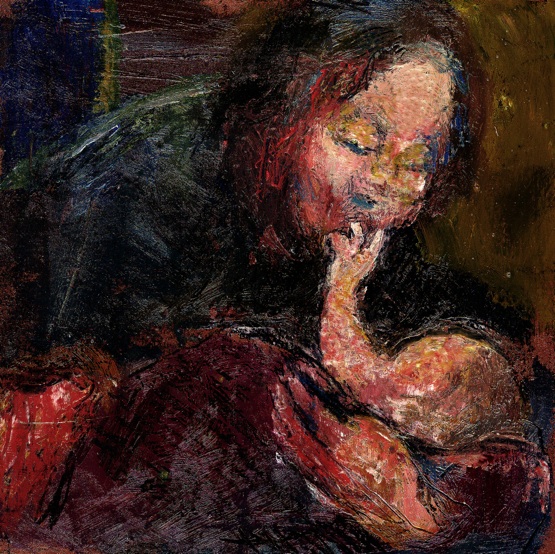We run our website the way we wished the whole internet worked: we provide high quality original content with no ads. We are funded solely by your direct support. Please consider supporting this project.

The Incarnation: More Than a Rescue Mission
A mistake people often make concerning the Incarnation is that they fail to distinguish the eternal plan of God to unite himself with humanity in Christ, on the one hand, from the atoning significance this plan acquired after the fall, on the other. Some therefore think of the Incarnation as a sort of “Plan B” that God had to activate to rescue humanity. It seems to me this “contingency plan” view of the Incarnation compromises the grandeur and beauty of God’s dream to live in unity with humanity (see post), since it makes it look like God would have preferred to remain in heaven and not united himself to us. Within this point of view, one might conclude that our sin forced God’s hand by requiring him to become a human to rescue us.
Others have rightly understood that the divine plan to incorporate humans “in Christ” by means of the Incarnation is spoken of in the New Testament not as a “Plan B,” but as God’s plan from the start. But, they fail to distinguish between the Incarnation itself and the atoning significance the Incarnation takes on in light of our rebellion, and therefore they come to the frightful conclusion that sin itself must have been part of God’s “plan A” all along! This leads to the difficult problems associated with the blueprint worldview where God predestines all things, even sin and rebellion.
The view of the Incarnation I’m advocating steers a middle course between these two interpretations and avoids both of their problems. It’s true that Jesus came to earth to overcome evil with sacrificial love. He came to vanquish the principalities and powers, pay for the consequences of our sin, restore us back to God, etc. And to accomplish this, Jesus had to suffer and die. But none of this suffering had to happen, for sin never has to happen. Sin, by definition, is what’s not supposed to happen. The suffering dimension of the Incarnation was rendered necessary only because of our rebellion.
But this doesn’t imply that the Incarnation itself was only devised as a rescue operation after our rebellion. And it certainly doesn’t imply that our rebellion was part of God’s eternal plan. Rather, as a number of theologians have argued throughout history, God would have become a human being and incorporated us “into Christ” even if there had been no rebellion.
As I see it, God’s original plan was to mature the relationship between humans and himself over time to prepare us for his union with us. Just as a marriage between two people is preceded by a period of courtship, so God courted humans in preparation for his marriage to us. The Incarnation is, as it were, God’s marital union with us, which is why we are called Christ’s bride.
The dream of a beautiful marriage between God and humanity was the reason God created the world. Therefore God was not going to let our rebellion and the rebellion of certain angels get in his way. Rather, with a manifold wisdom that is beyond human comprehension, God devised a way to “kill two birds with one stone.” The union of God and humanity in Christ would, first of all, consummate God’s marriage with us. And secondly, it would defeat the devil, end the reign of the Powers on the earth, free humanity from condemnation, and restore us back to our rightful place as co-rulers with Christ upon the earth.
“Mary and Her Baby” painting by Daniel Bonnell
Category: General
Tags: Atonement, Blueprint Worldview, Incarnation, Jesus, Open Theism, Redemption, Salvation
Topics: Atonement and The Cross
Related Reading

Giant Jesus
Yesterday’s post featured a video of Greg sharing about the role of the church in manifesting God’s character to the world. Here are some follow-up thoughts on that topic. The NT often uses the metaphor of “the body of Christ” to describe the church. When Jesus walked the earth, he did so in an ordinary…

What Jesus Revealed About Being Human
According to the creation story, when Adam and Eve ate the fruit, they essentially ceased being the wonderful, God-centered, God-dependent human beings the Creator intended them to be. They became less than fully human. Instead, they began using everything and everyone in the world as surrogate gods, trying to get from people, deeds, and things…

9 Things That Are True of Us When We’re Saved
Image by rAmmoRRison via Flickr The New Testament has many amazing things to say about who we are as believers because of what Christ has done for us. When the Lord saves us, he doesn’t just rescue us from eternal death; he gives us a completely new identity. Consider what happens to us when the Father…

What Does a Perfect God Look Like?
The “classical view of God” refers to the view of God that has dominated Christian theology since the earliest Church fathers. According to this theology, God is completely “immutable.” This means that God’s being and experience never changes in any respect. God is therefore pure actuality (actus purus), having no potentiality whatsoever, for potentiality is…

Did God Predestine Judas to Betray Jesus? (podcast)
Greg talks about the role Judas played in the crucifixion of Jesus and speculates about his potential for good. Episode 516 http://traffic.libsyn.com/askgregboyd/Episode_0516.mp3

Podcast: Can God Be Surprised?
Greg talks heaven and hell in this solid little episode. http://traffic.libsyn.com/askgregboyd/Episode_0394.mp3
